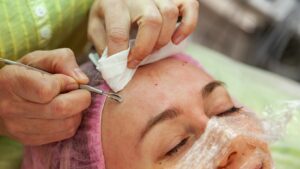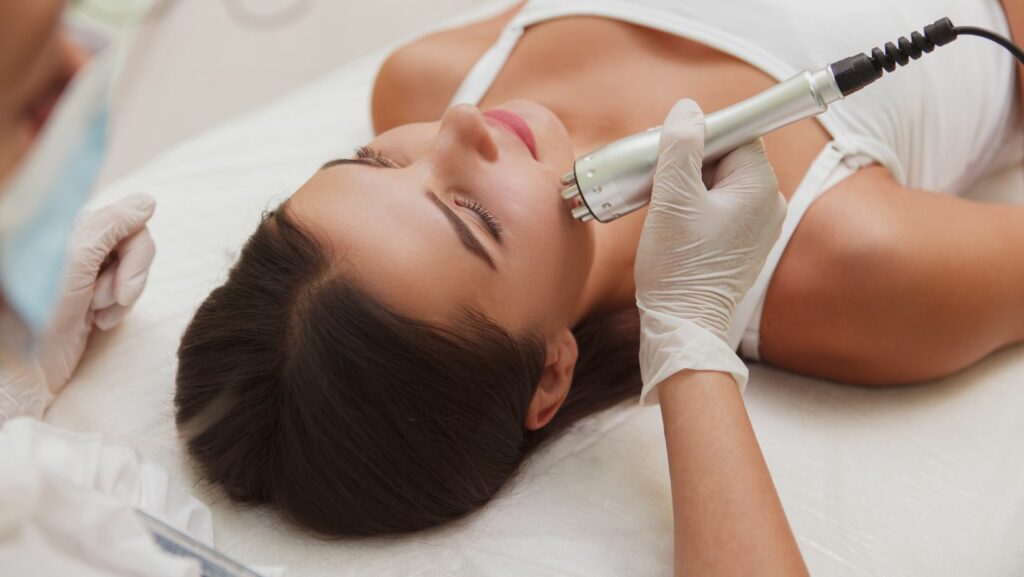![]()
![]() Laser Treatments for Acne
Laser Treatments for Acne
Laser treatments for acne utilize targeted light technology to address skin conditions. The laser penetrates the skin’s outer layer, heating the underlying tissue and producing a controlled injury that prompts collagen production. This process assists in healing active acne and improving scar appearance.
Types of laser treatments include:
- Ablative Lasers, such as CO2 and Erbium, remove the top layers of skin, allowing new, healthier skin to surface.

- Non-Ablative Lasers, like Nd:YAG and diode lasers, target deeper dermal layers without damaging the surface.
- Fractional Lasers create micro-injuries in the skin, promoting rapid healing by stimulating collagen.
Each type has unique applications and may suit different skin types or acne severity. Consultation with a dermatologist ensures treatment aligns with individual skin needs. Laser treatments are generally performed in multiple sessions to achieve optimal results, with potential side effects including redness and swelling, which typically subside within a few days.
In recent years, the precision and efficacy of laser technologies have improved, offering better outcomes for those struggling with persistent acne.
How Laser Treatments Work
Laser treatments target acne through focused beams of light. This technology penetrates the skin to address underlying causes of acne and promote healing.
Types of Laser Treatments
- Ablative Lasers
Ablative lasers, such as CO2 and Erbium, remove the outer skin layer, targeting severe acne scars. These lasers enhance skin texture but require longer recovery times.
- Non-Ablative Lasers
Non-ablative lasers, including Nd:YAG and diode lasers, heat the skin’s dermis without removing the outer layer. They treat active acne and stimulate collagen production with minimal downtime. - Fractional Lasers
Fractional lasers treat specific skin areas, leading to faster healing and improved acne scars. They suit varying acne severity and skin types by using microbeams to create thousands of tiny, deep columns in the skin, targeting both the epidermis and dermis without affecting surrounding tissue.
Individuals with persistent acne that resists topical solutions often turn to laser treatments. Those with moderate to severe acne scars benefit from laser therapy, as it targets both active breakouts and residual marks. Laser treatments suit various skin types, though individuals with darker skin tones should consult a dermatologist to minimize the risk of pigmentation changes. Those without specific underlying medical conditions or medications impacting skin sensitivity typically experience the best results.
![]() Benefits of Laser Treatments for Acne
Benefits of Laser Treatments for Acne
Laser treatments offer multiple advantages for individuals dealing with acne. They not only target active breakouts but also reduce the appearance of scars. This dual action enhances overall skin texture and tone. The precision of laser technology ensures targeted treatment, addressing specific blemishes without harming surrounding tissue. Another significant benefit is the non-invasive nature of laser treatments. Unlike surgical options, lasers provide an effective solution with minimal discomfort and reduced recovery time. This makes them appealing to those seeking quick and efficient skincare solutions.
Laser therapy also helps in controlling oil production. By targeting sebaceous glands, lasers decrease excessive oil, a common acne trigger. This effect is particularly beneficial for those experiencing adult or hormonal acne. Long-term benefits include the stimulation of collagen production. Collagen enhances skin elasticity and reduces the likelihood of future breakouts by maintaining healthy, resilient skin. Overall, laser treatments provide a multifaceted approach, offering both immediate and lasting improvements for those struggling with acne.
Laser treatments for acne offer a promising solution for those battling persistent breakouts and scars. By targeting deep skin layers, these treatments provide effective relief and long-term skin rejuvenation. With advancements in laser technology, patients can expect improved precision and reduced recovery times. Consulting with a dermatologist ensures personalized care that aligns with individual skin needs. While potential side effects exist, understanding and proper management can lead to successful outcomes. As more individuals seek comprehensive skincare solutions, laser therapy stands out as a versatile and effective option, offering both immediate and lasting improvements for clearer, healthier skin.

